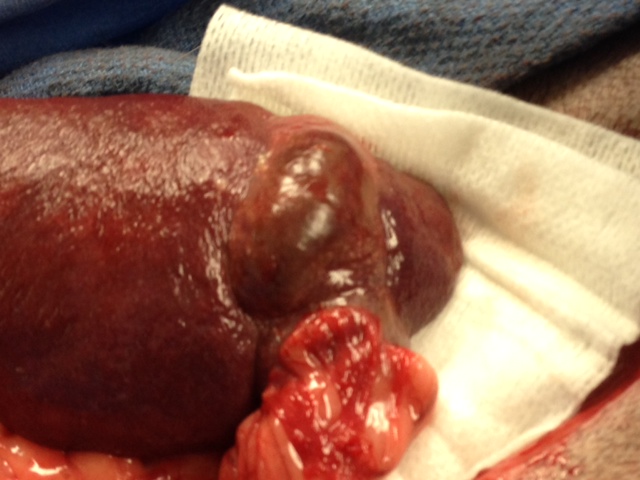The spleen is a burgundy colored organ that filters blood. It is found in the abdominal cavity near the stomach. I often feel it when I am performing abdominal palpation. Unfortunately, the spleen is one of the common places to find cancer in dogs. The following is a list of some of the common tumors (cancers) I see in dogs. Please remember, not all tumors are malignant. Many are benign and respond well to surgical removal of the spleen. Histopathology is required to make a final diagnosis.
- Hemangiosarcoma – This is a malignant tumor often seen in middle-aged to older German Shepherds, Labrador Retrievers and Golden Retrievers. Beside the spleen, this aggressive cancer also occurs on the right atrium of the heart and the liver.
- Hemangioma – This is a benign tumor that is also seen in middle-aged to older German Shepherds and retrievers, especially Goldens. Even though the tumor does not spread to other parts of the body like hemangiosarcoma, it can still be very dangerous. These tumors often bleed into the abdominal cavity causing life-threatening anemia. Microscopic analysis is needed to distinguish a hemangioma from a hemangiosarcoma although I have found hemangiomas are usually much larger in size than hemagiosarcomas.
- Lymphoma – I often see this cancer occur in the spleen along with lymph nodes throughout the body.
- Mast Cell Tumors – Mast cell tumors tend to spread quickly throughout the body and often affect the spleen.
- Many other tumors can occur in the spleen although not as commonly as the ones listed above. Bernese Mountain Dogs and flat-coated retreivers often get histiocytic sarcomas of the spleen. I have also seen plasma cell tumors and a variety of other tumors including leiomyomas, fibrosarcomas, melanomas and nerve sheath tumors.

Source:
-Shell, Linda (Original author), Intile, Joanne (Revision Author). Splenic Neoplasia. Associate, Veterinary Information Newtwork, Originally posted 3/29/2006. Updated 3/6/2015.